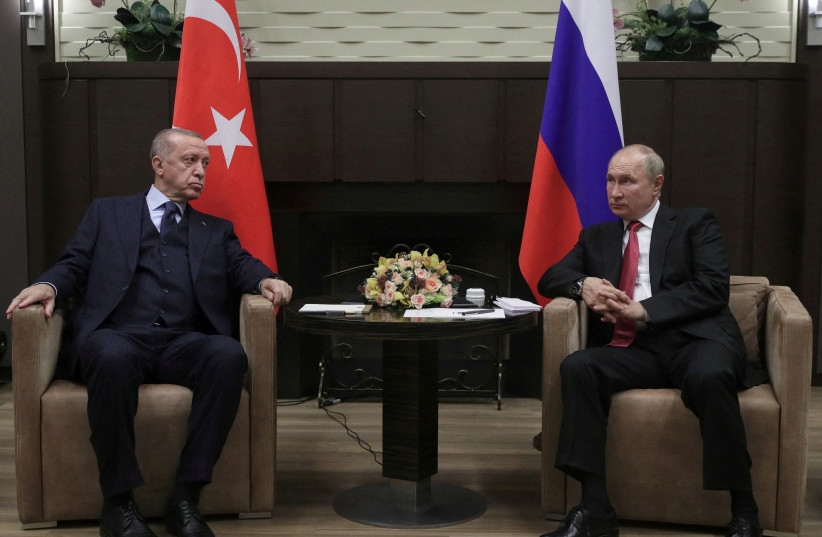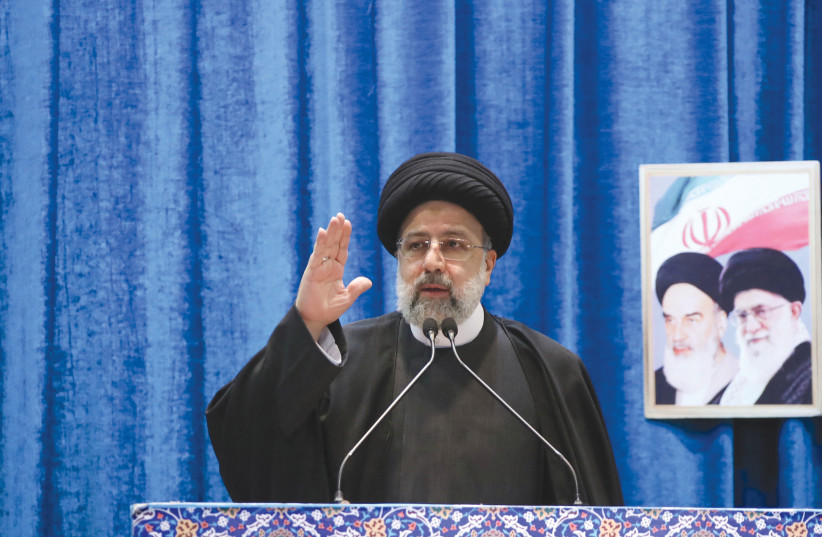The goal of the July 18-19 meeting in Iran is ostensibly part of the Astana process relating to Syria. This could have big ramifications for Syria, but it could also be another mediocre meeting.

A new era of Turkey-Iran-Russia relations could be forming. Turkish President Recep Tayyip Erdogan is going to meet his Iranian and Russian counterparts this week. This comes in the wake of US President Joe Biden visiting the region. The goal of the July 18-19 meeting in Iran is ostensibly part of the Astana process relating to Syria. This could have big ramifications for Syria, but it could also be another mediocre meeting. On what does the meeting hinge? What matters?
Syria is currently divided. The Russian and Iranian-backed Syrian regime controls the major cities, while Turkey controls northwest Syria and the US-backed Syrian Democratic Forces control eastern Syria.
Russia’s goal in Syria is a stable Syrian regime. Iran’s goal is to use Syria as a base for threats against Israel and also to traffic weapons to Hezbollah in Lebanon. Turkey’s goal in Syria is to use it as a dumping ground for Syrian refugee pushbacks, also to cultivate pro-Turkish Syrian rebel groups; and to remove Kurds from border areas. The US goal in Syria is ostensibly to defeat ISIS, but ISIS was mostly defeated in 2019, and the US overall policy remains unclear.
There are other issues afoot.
Russia is at war in Ukraine and Iran wants to take advantage of Russia’s distraction to expand its influence in Syria. Iran also uses Syria to traffic drugs, mostly captagon pills, a traffic that threatens Jordan and the Gulf. Turkey wants to begin a new invasion, targeting Kurds in Manbij and Tel Rifaat and other areas. Meanwhile, the US recently used a drone to kill another ISIS leader near the Turkish border between Idlib and Afrin. In the wake of the Biden visit, it’s important that Iran and Turkey feel they are getting press and high-level attention from Putin.

“As part of the visit, the seventh meeting of the top-level Turkish-Iranian Cooperation Council will be held on July 19. It is planned to approve steps on the further development of bilateral relations. Along with bilateral matters, it is also planned to discuss regional and global issues.”
Turkish presidential office
The Turkish presidential office released a long statement on the meeting: “As part of the visit, the seventh meeting of the top-level Turkish-Iranian Cooperation Council will be held on July 19. It is planned to approve steps on the further development of bilateral relations. Along with bilateral matters, it is also planned to discuss regional and global issues.”
The Turkish presidential office also said, “on the same day, our president will take part in the seventh Astana-format summit chaired by the Iranian president [Ebrahim Raisi] and attended by Russian President Vladimir Putin. During the summit, the sides will hold political consultations on the situation in Syria, the fight against terrorist organizations posing threats to the region’s security, such as the Kurdistan Workers’ Party and Islamic State (outlawed in Russia), will discuss efforts geared toward reaching a political solution, the humanitarian situation, the problem of voluntary return of Syrian refugees.”
A meeting between Putin and Erdogan, alone, is planned. Russian media didn’t have much to say on the trip. Iranian media noted “all three countries have interests in Syria; Iran and Russia support the legitimate government of Damascus and Turkey is one of the opponents of Bashar Assad.” Other reports say that although Turkey wants to launch a new offensive, Iran opposes this operation. “Tuesday’s meeting will also allow Erdogan to hold his first face-to-face meeting with the Russian president since the start of Moscow’s special military operation in Ukraine,” Iran’s Fars News noted. AFP also reported on the upcoming meeting, noting that Ankara wants a green light for its operation.
Turkey’s Anadolu media said that all aspects of the Turkey-Iran “relations and potential steps that would enhance the bilateral cooperation will be discussed during the Council Meeting, which will be held with the participation of relevant ministers.” Among the issues Turkey is discussing is not only its demand for a new operation against “terror groups” but also a desire to look at “the humanitarian situation and the voluntarily return of Syrians to their homes will be on the agenda of the summit,” it added.
Overallm big questions hang over this meeting. If Russia and Iran approve a new Turkish offensive, then the US will be in a complex position. The US backs the SDF but Turkey seeks to target areas influenced by the SDF but not areas the US controls. The US left parts of Syria in 2019 at the behest of Turkey when Turkey invaded a border area. Ankara has ethnically cleansed Kurds, Yazidis. And others from Afrin and Sere Kaniye. The US has sanctioned one of the Syrian extremist groups backed by Ankara. With the US concentrating on Ukraine, it is unclear if Washington will be able to deal with a new crisis in Syria.
Content retrieved from: https://www.jpost.com/middle-east-news/article-712379.
Good day! Do you use Twitter? I’d like to follow
you if that would be ok. I’m undoubtedly enjoying your blog and look forward
to new posts.
@rpballance Yes Im on Twitter